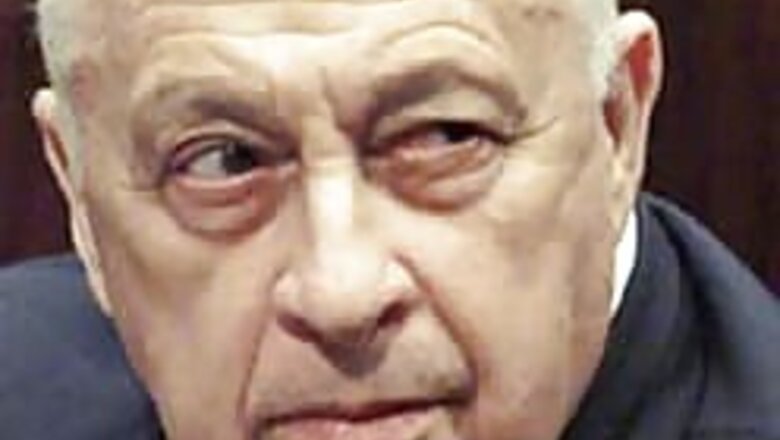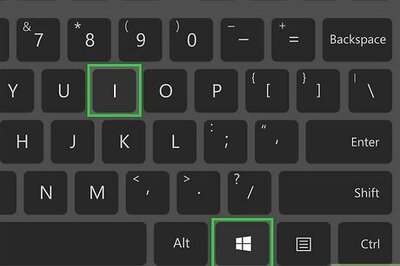
views
Jerusalem: Israeli Prime Minister Ariel Sharon, recovering from surgeries after a major stroke, on Tuesday began moving limbs on the left-hand side of his body in response to pain stimulus, Israeli radio reported.
On Monday, Sharon had responded to a similar pain stimulus by slightly moving his right arm and leg, Hadassah Hospital officials said.
Sharon, 77, remains in "serious condition" and has not opened his eyes, hospital director Dr. Shlomo Mor-Yosef said.
Sharon is breathing on his own and his anesthesia has been reduced as doctors gradually bring him out of a medically induced coma, he said.
"In the pain stimulus test on Monday, we noted that the prime minister slightly moved his right arm and right leg," Mor-Yosef said. "This was a very slight movement, but it is a significant one."
"The response of the prime minister [was] also accompanied by a rise in the blood pressure which, in this case, is also a positive response."
In a brain scan performed on Sunday, Mor-Yosef said doctors saw progress, including a reduction of the fluid in the brain.
Sharon has been hospitalized since Wednesday, when he suffered a stroke on the right side of his brain. He since has undergone three rounds of brain surgery. Awakening him is a critical step towards evaluating the extent of any brain damage.
Motor functions on the right side of Sharon's body would be controlled by the left side of his brain, which would have been affected less by the stroke and subsequent bleeding in his brain.
Dr Felix Umansky, who headed the team that operated on Sharon three times last week to stop cerebral hemorrhaging after the stroke, said Sharon remains in an induced coma and it is not possible yet to perform "cognitive function" tests to determine how much damage Sharon's brain had suffered.
As for tests to determine how much Sharon's brain has been damaged, Umansky said, "It is too early to speak about cognitive function. We are constantly testing the prime minister and examining the level of anesthesia to reach a state where we can examine cognitive function. That will take a number of days."
PAGE_BREAK
Umansky said doctors plan to continue to reduce the level of anesthesia that has kept Sharon in an induced coma.
He said doctors will continue to conduct pain stimuli tests, look for movement in Sharon's arms and legs, and watch for when he opens his eyes. He said "days can pass" during the process and doctors may decide to increase the levels of anesthesia again.
In discussions with Sharon's family and his aides, doctors have begun to speak less about whether Sharon will live or die, turning more to what his condition will be once he is awake.
Asked when he could say that Sharon is no longer in serious condition, Umansky said, "The moment he is conscious, that he speaks to us, that his systems work as they should -- then we can say he is no longer in serious condition."
Umansky added, "This is a very, very gradual process."
Olmert holds Cabinet meeting
Acting Prime Minister Ehud Olmert presided over the weekly Cabinet meeting Sunday, leaving the chair Sharon usually occupies empty.
"We are hoping and wishing that the prime minister will recover, strengthen and return to presiding over the Israeli government and leading the state of Israel," Olmert said as the meeting commenced.
"In the meantime, we will continue to do what 'Arik' would want -- running affairs as they should be."
Medical experts have said it is unlikely Sharon would recover enough to be able to lead the country.
But the prime minister's top aide, Ra'anan Gissin, seemed more optimistic after visiting Sharon on Saturday.
"He's got out of the dangerous zones and life-threatening situations more than the average person and, therefore, my belief is that he's going to pull through," Gissin said.
Shimon Peres, a former Israeli prime minister and major figure in Sharon's new Kadima Party, said Sunday he will not seek to be prime minister. Peres told CNN he will back Olmert.
PAGE_BREAK
Sharon's stroke comes at a politically sensitive time for his Kadima Party, which faces its first national election, scheduled for March 28.
In November, Sharon abandoned the dominant right-wing Likud bloc he helped found in 1973. He had hoped to build support for his contentious proposal to turn over Gaza and parts of the West Bank to Palestinian control, while dismantling some Israeli settlements.
Faced with strong opposition from his Likud counterparts, Sharon left the bloc and formed the centrist Kadima Party, hoping to sow fertile political ground.
By moving toward the center of the political spectrum, Sharon had planned to complete the West Bank withdrawal and conduct final negotiations with the Palestinians based on the "road map" for peace being pushed by the US, the European Union, the UN and Russia.



















Comments
0 comment